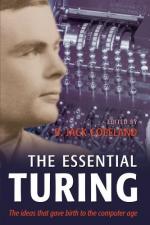|
This section contains 1,477 words (approx. 5 pages at 300 words per page) |

|
Alan Mathison Turing (1912–1954), the founder of modern computer science and an important World War II cryptanalyst, was born in London on June 23. He died near Manchester, England, on June 7. His short life illustrates the ethical conflicts and ambiguities of scientific and technological aspirations.
Basic Creativity
Turing's early life was characterized by an intense enthusiasm for science that was only weakly supported by his upper-middle-class family. In 1931 he became an undergraduate at Cambridge University and read mathematics, demonstrating a rapidly emerging originality. At age twenty-four he settled an important problem in the foundations of mathematics, using a method that had much wider implications. Turing developed a precise way to characterize the concept of the "effectively calculable." This consisted of the "Turing machine," as the logician Alonzo Church immediately dubbed Turing's construction when reviewing it in 1937.
A Turing machine is an imaginary device with a finite number of...
|
This section contains 1,477 words (approx. 5 pages at 300 words per page) |

|


